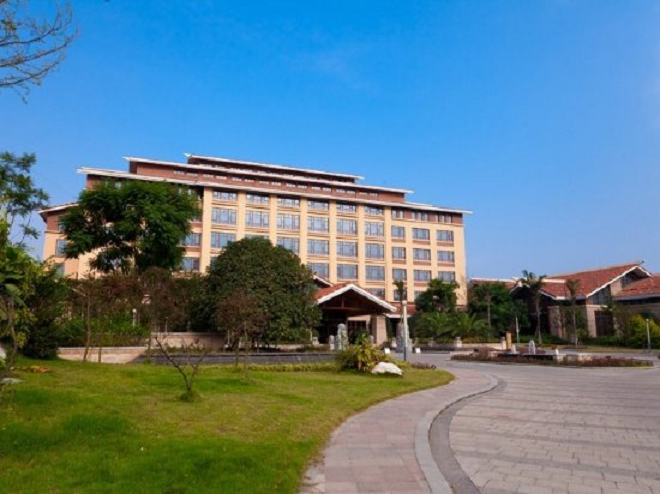In every summer of the past decade, young students from world-renowned universities such as Harvard, Yale, Oxford, Cambridge and from China’s top universities will gather in Xinjin, a waterside city in western China. So, why a small city like Xinjin can find favor with these world-famous universities? To answer this, it has to go back to an old and elegant water sport, namely the rowing.
This year, the 9th (2018) International University Rowing Regatta in Chengdu, China, reignited people’s passion for rowing. With an inclusive attitude and an international vision, Xinjin gathered students from elite universities at home and abroad, once again drawing global attention.
Xinjin Seeks to Turn itself a Well-known City of Rowing Regatta
As the poetry goes, “The lofty wall safeguards the Three Qin Districts. The five grand ports can be seen through mists.” from Wang Bo, a great Chinese poet in Tang dynasty, the “five grand ports” is believed to refer to Xinjin, the city famous for its location where five rivers meet.
Water prospers and inspires Xinjin, giving rise to an age-old surviving of water sports. Legend has it that Xinjin had developed the tradition of dragon boat race in the Tang dynasty. Du Fu, the “Poet-Sage” of China, specially visited Xinjin to watch the grand race. In the Qing dynasty, the dragon boat race transformed into an annual event. Although the distinct history of birth and development between rowing and dragon boat race, the similar shapes and racing style linked them together. Consequently, rowing turned to be a mass sports activity and a signature event of Xinjin.
With success in the previous nine sessions, International University Rowing Regatta has evolved from a local sports competition to a grand comprehensive cultural event with global fame and reputation that combines international elements and folk customs. Acting not only as a platform for learning skills, rowing race also builds a bridge for Chinese and overseas youths.
Especially in this year, Xinjin has built a permanent professional competition venue, putting greater efforts on the construction of Chengdu as “World Famous City for Competitions” and to shape brand competitions. This move has perfected the competition-related supporting facilities, improved the fairness and impartiality, and made competitions more professional.
During the process, Chengdu International University Rowing Regatta has become a resounding competition IP.
Xinjin Rises to Fame from a Rowing Race
Rowing in its sports form developed in England in the 1700s, beginning from the competition among watermen that provided ferry service on the River Thames.
Since its birth, the modern rowing has been labelled as an intercollegiate race among “world-famous universities”. The first rowing race was held in 1715 to commemorate the coronation of the King of England. Such rowing race between Oxford University and Cambridge University first took place in 1829, which has developed as a classic intercollegiate sporting event since 1856. Over the past 180 years, the race has been held every year except for occasional breaks due to the two World Wars. Given this long-lasting history, rowing race is considered as the oldest sporting event in the world.
In recent years, it has begun to catch on in noted universities in China. Dating back to July 1999, the Peking-Tsinghua Rowing Competition triggered the mass participation of other well-known domestic universities. In 2009, Xinjin held the International University Rowing Performance & Celebrating of Traditional Dragon-Boat Festival, opening the dialogue with international rowers. In the next year, the successful holding of the First International University Rowing Regatta in Xinjin made the city officially the top-choice venue for such events in China.
“Xinjin Power” Emerges as World Influence
The hosting of international competitions has given the Xinjin a worldwide attention.
What makes Xinjin so fascinating is not only about the passion of rowing and dragon boat race, but also the unique charm it gives out.
Enjoying a prime location, this city is termed as the “South Gate” of Chengdu. In addition, as the “cradle of China’s private economy”, it has cultivated a large number of well-known private enterprises at home and abroad such as New Hope Group and Chengdu Xinzhu Road & Bridge Machinery Co., Ltd. By far, Xinjin houses 14 Fortune Global 500 enterprises, 42 listed companies, and 35 upstream and downstream firms engaged in transportation equipment. In 2017, it reached a regional GDP of over RMB 30 billion, ranking 16th among the top 100 small and medium-sized counties and cities in China with the greatest investment potential.
Nowadays, Xinjin plays a major role in Chengdu’s “South Extension” area. It is more than a crucial material distribution centre and traffic hub in western Sichuan, but a must-passed place for Sichuan’s economic and technological development to the southwest.
Following the strategic positioning of building Xinjin a “sub-centre of southern Chengdu and a riverside park-like city”, this city will be moulded into a southern central city, a high-end industrial innovation city, a gateway and hub city in southern Chengdu, and a modern riverside park-like city in Chengdu’s next new-round master plan.
In terms of resources, Xinjin boasts five rivers, two mountains, wetland resources, an all-connected green network, a 33 km2 of green city center, several livable and industry-friendly new towns, and three industrial functional areas, namely the Tianfu New Area Industrial Park West, Tianfu AG Expo Park, and Pear Flower Valley Cultural Tourism District. By leveraging these advantages, it endeavors to create an impression of “a city built among parks, a city scattered with parks”.
It is believed that what impressed these worldwide students most is not only the fierce competitions but also the exquisite and graceful modern city of Xinjin and the hospitality and inclusiveness of its people.
Source: The 9th International University Rowing Regatta, Chengdu China 2018

